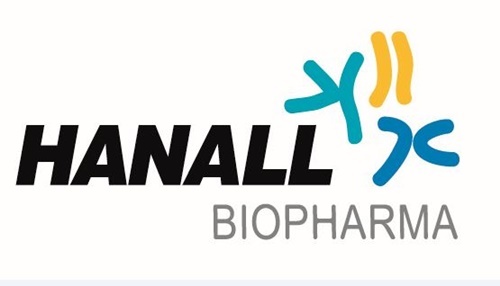HanAll's myasthenia gravis drug enters phase 3 trial
Korean biotech plans to begin phase 3 clinical trials in Japan in H2
By Kan Hyeong-wooPublished : July 17, 2022 - 14:38

HanAll Biopharma’s antibody therapy candidate for myasthenia gravis -- HL161, also known as batoclimab, a subcutaneous anti-FcRn antibody designed to treat autoimmune diseases -- has entered phase 3 clinical trials in the United States, the South Korean biotech said Sunday.
Myasthenia gravis, or MG, is a rare autoimmune disease that happens when the nerve impulses are not properly transmitted to the muscles, eventually leading to weakness in the skeletal muscles. According to a research paper published in The Lancet, it is estimated that MG affects more than 700,000 people across the globe.
Immunovant, HanAll Biopharma’s US partner, has acquired the technological license of HL161 in North America.
HanAll Biopharma said the company also plans to begin batoclimab’s phase 3 clinical trials in Japan in the second half of this year. Harbor BioMed, HanAll Biopharma’s Chinese partner, entered phase 3 clinical trials of its MG treatment candidate in September last year and is expected to seek the Chinese drug authorities’ approval by the end of this year.
The global MG market is expected to grow from $1.22 billion (1.6 trillion won) in 2021 to $2.03 billion in 2028 with a compound annual growth rate of 7.5 percent, according to Fortune Business Insights.
According to HanAll Biopharma, European biotech Argenx’ Vyvgart is the only FcRn inhibitor treatment that have been approved by the US Food and Drug Administration for MG therapy. It obtained the FDA’s nod in December last year. Vyvgart has also been approved for the treatment of MG in Japan.
HanAll Biopharma pointed out that the current MG therapy requires a physical visit to the hospital as patients need clinical experts to formulate an intravenous treatment and administer it over a few hours.
The Korean biotech said batoclimab, which was developed as a simple subcutaneous injection, is expected to enable self-administration at home, which will take less than 10 seconds to complete the process for patients. The company added that batoclimab has shown the advantages of rapid onset of its effects along with a favorably safety profile from the phase 2 clinical trials.
Myasthenia gravis, or MG, is a rare autoimmune disease that happens when the nerve impulses are not properly transmitted to the muscles, eventually leading to weakness in the skeletal muscles. According to a research paper published in The Lancet, it is estimated that MG affects more than 700,000 people across the globe.
Immunovant, HanAll Biopharma’s US partner, has acquired the technological license of HL161 in North America.
HanAll Biopharma said the company also plans to begin batoclimab’s phase 3 clinical trials in Japan in the second half of this year. Harbor BioMed, HanAll Biopharma’s Chinese partner, entered phase 3 clinical trials of its MG treatment candidate in September last year and is expected to seek the Chinese drug authorities’ approval by the end of this year.
The global MG market is expected to grow from $1.22 billion (1.6 trillion won) in 2021 to $2.03 billion in 2028 with a compound annual growth rate of 7.5 percent, according to Fortune Business Insights.
According to HanAll Biopharma, European biotech Argenx’ Vyvgart is the only FcRn inhibitor treatment that have been approved by the US Food and Drug Administration for MG therapy. It obtained the FDA’s nod in December last year. Vyvgart has also been approved for the treatment of MG in Japan.
HanAll Biopharma pointed out that the current MG therapy requires a physical visit to the hospital as patients need clinical experts to formulate an intravenous treatment and administer it over a few hours.
The Korean biotech said batoclimab, which was developed as a simple subcutaneous injection, is expected to enable self-administration at home, which will take less than 10 seconds to complete the process for patients. The company added that batoclimab has shown the advantages of rapid onset of its effects along with a favorably safety profile from the phase 2 clinical trials.



















![[Today’s K-pop] Treasure to publish magazine for debut anniversary](http://res.heraldm.com/phpwas/restmb_idxmake.php?idx=642&simg=/content/image/2024/07/26/20240726050551_0.jpg&u=)